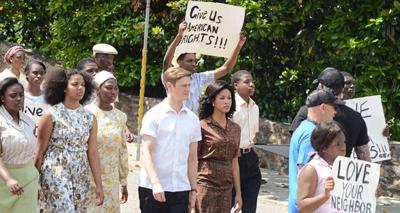Son of the South (2020)

Photo from movie, “Son of the South” / IMDB photo gallery
Lucas Till as Bob Zellner (in white shirt) and Lex Scott Davis as SNCC member Joanne (in brown dress) join others in a demonstration for equal rights.
“Son of the South” is a movie based on Bob Zellner’s 2008 autobiography, “The Wrong Side of Murder Creek: A White Southerner in the Freedom Movement.” Ed McNulty, writer and editor of Visual Parables Journal, says, “At first glance the film might seem to be another tale Hollywood loves to make: a white liberal comes to the rescue of poor downtrodden Blacks, ala Mississippi Burning.” But this is a real-life story of a white man who “is not a savior figure. Rather, he is the one who needs saving.”
Zellner is the grandson of a Ku Klux Klansman, and his father was a KKK member who became a moderate after witnessing the excesses of Nazi Germany. Unlike his father, Zellner immersed himself in the Civil Rights Movement, taking on the estrangement from his family, friends and even his fiancé, as well the dangers of white and governmental violence. But the movie is not about Zellner’s heroism. It is about the Civil Rights Movement in the South where Zellner is learning, joining and engaging.
No white person who became active in the movement would say that the white people were a primary factor in the movement work, which was properly led and populated by Black leaders and citizens. But the involvement of Southern whites was nevertheless important as examples that it was and is possible to break through the barriers of socialized racism and apartheid and move beyond white resistance, denial, and guilt to become true allies in the fight against racism. The film illustrates this with appearances of many of the real-life activists, including Ralph Abernathy, Rosa Parks, Eleanor Roosevelt, Virginia Durr, Jessica Mitford, Jim Zwerg, Charles McDew, Jim Forman, and John Lewis.
For Zellner, the path to becoming a civil rights activist began with writing a paper where he and other white students interviewed Blacks to learn what they were thinking even though their professor told them not to do it. Bob Zellner was transformed into a firebrand for justice and equality. He demonstrates that it is possible to rise above ingrained racism surroundings and become a champion of freedom for all. And it all began with a paper for a sociology course.
While the extent to which religious faith was actually important in Bob Zellner’s commitment and work isn’t known for sure, an article in the SNCC Digital Library says his “interest in civil rights was rooted in his religious faith.” And it is noteworthy that almost every single white Southerner who got involved came from their religious background. Many, if not most, of the earliest were Methodists, including not only Bob, but others like Ed King, a young Methodist minister; and Sue Thrasher, who along with Bob organized the Southern Student Organizing Committee (SSOC) to reach out to white college students to get them involved. One factor in raising the consciousness of many of them was the coterie of committed young folks involved in the publication of Motive magazine, the organ of the Methodist Student Movement in Nashville.
